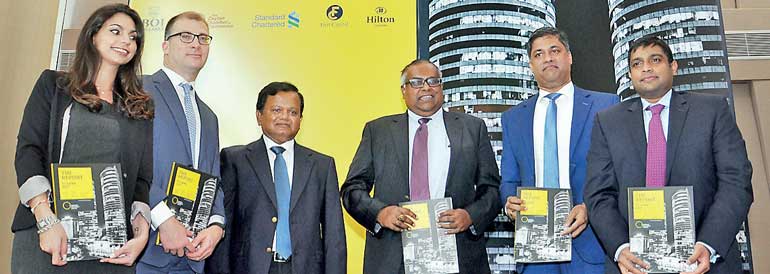Monday Feb 16, 2026
Monday Feb 16, 2026
Tuesday, 20 June 2017 00:08 - - {{hitsCtrl.values.hits}}
 From left: Oxford Business Group Country Director Andrea Tsiachtsiri, Oxford Business Group Editor-in-Chief Oliver Cornock, BOI Chairman Upul Jayasuriya, Ceylon Chamber of Commerce Chairman Samantha Ranatunga, First Capital CEO Dilshan Wirasekara and Standard Chartered Commercial Banking Head Dushan Casie Chetty with the report – Pic by Ruwan Walpola
From left: Oxford Business Group Country Director Andrea Tsiachtsiri, Oxford Business Group Editor-in-Chief Oliver Cornock, BOI Chairman Upul Jayasuriya, Ceylon Chamber of Commerce Chairman Samantha Ranatunga, First Capital CEO Dilshan Wirasekara and Standard Chartered Commercial Banking Head Dushan Casie Chetty with the report – Pic by Ruwan Walpola
By Charumini de Silva
Sri Lanka needs to concentrate on a much-needed modernisation drive and structural reforms to improve growth, experts said yesterday, as the country attempts to break out of its low-middle income status.
Sri Lanka’s plans to boost economic growth, which places tourism development high on the agenda, towards a new era of optimism buoyed by strong growth, low unemployment and rising incomes were mapped out in a report by the Oxford Business Group.
Titled ‘The Report: Sri Lanka 2017’, it also highlighted Sri Lanka’s plans to capitalise on high levels of investor confidence and a $ 1.5 billion program with the International Monetary Fund (IMF) to implement a much-needed modernisation drive and structural reforms.
Speaking at the launch event, OBG Editor-in-Chief Oliver Cornock said the report this year has outlined that the reforms needed to help Sri Lanka reach its long-term goal of securing sustainable and inclusive economic growth were taking shape.
“The post-war years have brought impressive economic expansion and investor interest; pockets of poverty and inequalities remain an issue,” he added.
He said the finding suggests that Sri Lanka’s new administration is already moving to align its economic policy and address these weaknesses, while embarking on an infrastructural overhaul that will sit well with investors eyeing the country’s many opportunities.
Considering the global economic outlook, Cornock pointed out that growth in emerging markets is still very strong, adding that Sri Lanka is well located among huge growing engines like India and China.
OBG Managing Editor for Asia Paulius Kuncinas in a statement agreed that there was a tangible sense of optimism in Sri Lanka, with new trade deals in the pipeline and a shift in the economic landscape towards service-led industries.
“Sometimes overlooked, Sri Lanka has a fascinating story to tell, which most recently includes 15 years of continuous growth,” he said.
“With ambitious plans that include transforming the country into an international transport hub and driving new growth in the greater Colombo region, the Government’s bid to take Sri Lanka’s development to the next level looks to be well on track,” Kuncinas pointed out.
OBG analyses the part that improved transport infrastructure, including upgrades to ports and roads together with Customs reforms, will play in supporting Sri Lanka to strengthen trade and international relations, while building on its strategic location in the Indian Ocean.
It also explores the Government’s plans for developing the tourism sector further, while highlighting the activity already underway, which includes a raft of new hotel openings.
In addition, OBG looks in detail at the country’s fast-developing telecommunication and IT industry, which is being driven forward by rising demand for a wider range of services from a growing and increasingly tech savvy population. Other areas of Sri Lanka’s economy examined agricultural industry, which is earmarked for modernisation as a part of a national drive to boost both production and exports.
In addition to the launch event of the report, there was a discussion where experts shared their insights on the building blocks expected to drive growth across key sectors of the economy.
First Capital CEO Dilshan Wirasekara called for policy consistency as it had deterred the confidence and momentum of the economy with many investors waiting to see changes come into the system.
“No matter what policy, we need consistency. The latest example was the Budget 2017 which brought in a significant number of tax changes to the capital market which was implemented. This creates a ‘wait-and-see’ phase for foreign investors,” he added.
He said if the proposed Inland Revenue Act and Foreign Exchange Management Act would be put into place, it would help the building blocks which are critical to take Sri Lanka to the next level.
In addition, he said the implementation of the Central Counter Party (CCP) system at the Colombo Stock Exchange by the end of the year as well as digitalising the processes of financial services would bolster the investment climate in the country.
However, he said it was unfortunate that Sri Lanka was too dependent on banks and financial institutions, which “rip-off people.”
“It is important to acknowledge the importance of the capital market. The banks and financial institutes are ripping off the consumers. What we need is a financial disintermediation, which would allow investors to access the capital market directly for cheaper funding,” Wirasekara stressed.
Agreeing with Wirasekara, BOI Chairman Upul Jayasuriya also highlighted the need for regulations that allow investors to tap into private equity, which will also make their businesses more viable.
“We need to encourage private equity to come into the country,” he added.
He said that there are a number of factories that close down every month in the zones as the companies are unable to pay their bank loans.
“While attracting new investments to the country, it is also our duty to retain existing investors in the 12 zones we have at present. There are a number of companies closing down their factories every month as they are unable to repay bank loans.”
Noting that 15 new licensed zones will be launched under the BOI, Jayasuriya asserted that the Government has outlined special allowances in the Northern and Eastern provinces.